In 2015, superhero enthusiasts were treated to not one, not two, but three amazing shows that followed the adventures of female heroes: Agent Carter, Supergirl, and Jessica Jones. Not only do these shows feature new and interesting aspects of their respective cinematic universes, but each show explored, and continues to explore, the unique and often heartbreaking societal struggles that women face in the present day and beyond. These shows say something about the world while simultaneously depicting heroes saving the world.
And we want more! While these three shows are a fantastic start, they’re still only chronicling the perspectives of white women, and there are so many stories outside of that perspective that have yet to be told in superhero-centered television.
Here’s a list of nine non-white female heroes we think should get their own TV shows. We know there are plenty of other worthy candidates out there, so add your picks in the comments!
Kamala Khan, a.k.a. Ms. Marvel
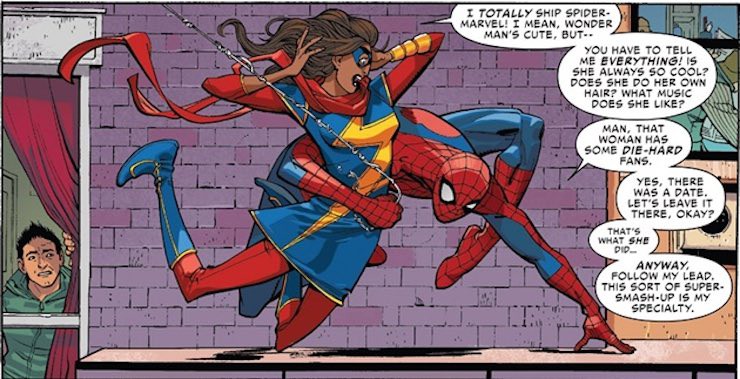
While we’ll be seeing her in animated form on Avengers Assemble, Kamala Khan has become such an overwhelmingly popular character in the past few years that she deserves her own live-action series, as well. What endears her to readers—and hopefully television viewers, too!—are the three Fs: family, faith, and fandom. Trying to keep her ability to stretchy/embiggening powers secret from her parents is usual superhero fare, but Kamala has the extra emotional strain of trying to be a good Muslim and a good daughter. And with fandom part of the mainstream, seeing someone like Kamala—with her hero worship of Captain Marvel and predilection for taking selfies with heroes like Wolverine—makes her even more relatable to teenagers who perform their fandom on Tumblr and other social media channels. Kamala begins her story as an outsider, as someone who wishes she could be like Captain Marvel. When her Inhuman powers transform her into a copy of her idol, she’s horrified. Over the course of G. Willow Wilson’s Ms. Marvel comic series, she grows to realize that what she really wants to be is herself—that’s the kind of arc that should play out on TV, as well. —Natalie Zutter
Raquel Ervin, a.k.a. Rocket (Milestone Comics)
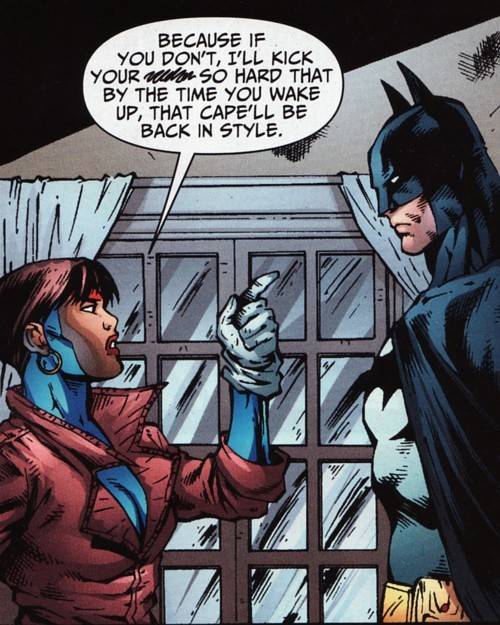
Rocket was a debut character in Milestone Comics, a new comics media universe distributed by DC in the 1990s with the intent of depicting black superheroes with a variety of different backgrounds. Characters from this line were folded into the DCU in 2008, more than ten years after Milestone shut down production, and have been appearing mostly in DC’s animated shows, like Young Justice, Brave and the Bold, and Justice League. These characters still exist on the periphery, however, and that’s a shame when you consider how DC could make an extremely interesting live-action show featuring the Milestone character Rocket.
In the comics, Rocket is a black teenager growing up in the poorest section of her city when she encounters Icon, the Superman-type hero of her world. The two of them end up inspiring each other to be better, to try harder, and Icon gifts Rocket with a kinetic belt so she can fight injustice alongside him. Icon isn’t perfect, though. He tends to want to solve problems with force when discussion would be more effective. As a person Icon trusts, Rocket often points this out and thus becomes a necessary corrective to the tremendous power that Icon represents. Her story presents a unique perspective on ideal superheroes, and it would be great to see a show where the “superman” is in the background, just another problem in the day-to-day life of the main character.
Rocket’s situation would also prompt a nuanced exploration of the societal expectation of women as caretakers. Not only does she act as Icon’s conscience at times, but her story begins with her pregnant with her teenage boyfriend’s child, adding another layer to the viewpoint of women as caretakers. Teen motherhood can be a complex and interesting situation to explore when it isn’t treated as a stigma. Doubly so when that mom is a superhero.
Rocket’s story tackles issues regarding class, gender, race, and supermen, all at the same time. Perfect in the current age of the serialized superhero. –Chris Lough
Mari Jiwe McCabe, a.k.a. Vixen
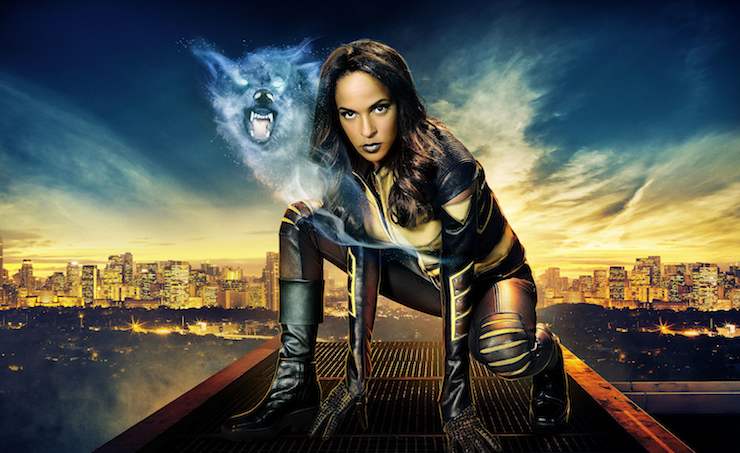
Mari McCabe is already stepping up in the DC TV-verse: Vixen was given her own animated streaming-only show on the CW, but the exciting news comes from Arrow—Megalyn Echikunwoke, who voices the character on the cartoon, will be making her first live action appearance as the character in the next month or so. (That’s her, pictured above!) Following that, could there be room for more live-action spots… and perhaps a shot at turning the cartoon into a live show? Has that ever even been done before? Normally it goes in the opposite direction. It would be amazing because Vixen is a character who was sidelined from her inception; intended as DC’s first African female superhero with her own series, her comic was instantly cancelled, and Vixen was relegated to team-up land. While there’s ample chance for the character to be rendered awkwardly (her powers are attained via a totem that allows her to assume the powers of any animal, so showrunners must take care to bypass the “noble savage” trope), Mari is a wonderfully no-nonsense hero who gets to play around with a set of really fun powers. –Emmet Asher-Perrin
America Chavez, a.k.a. Miss America
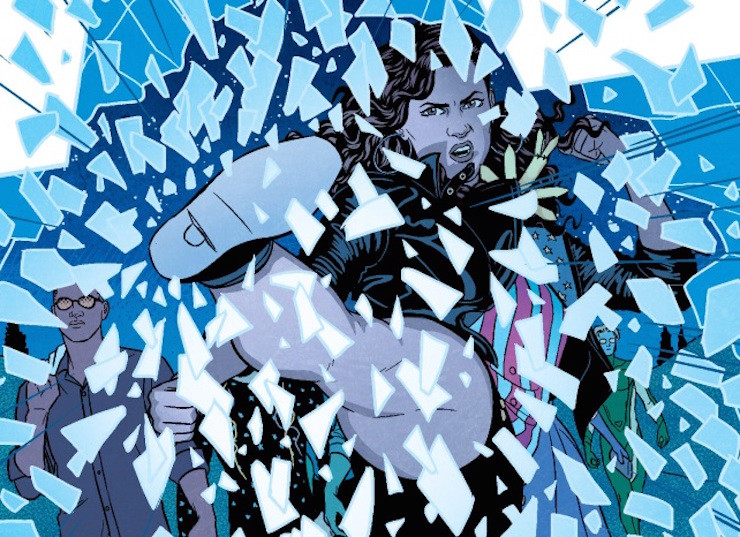
While superhero movies might be accused of taking themselves too seriously, television does not have that problem. And while we may be too fatigued with the big-screen Avengers to actually care that much about Captain America: Civil War, that actually provides the perfect boot-shaped hole for America Chavez to kick her way into the Marvel Cinematic Universe. She’s a queer Latina raised by two moms in the Utopian Parallel, who takes her heroic inspiration from their sacrifice and who uses violence when necessary without ever losing her cool. Most of all, despite taking her name from preexisting superheroes, she doesn’t actually care about the old guard. “You couldn’t pay me to be in the Avengers,” she famously scoffed in Kieron Gillen and Jamie McKelvie’s Young Avengers. So let’s not try to pigeonhole her! The best thing about America Chavez is that while she could kick her way into various multiverses and fit in with different groups, she’s still a standout. —Natalie Zutter
Maya Lopez, a.k.a. Echo/Ronin
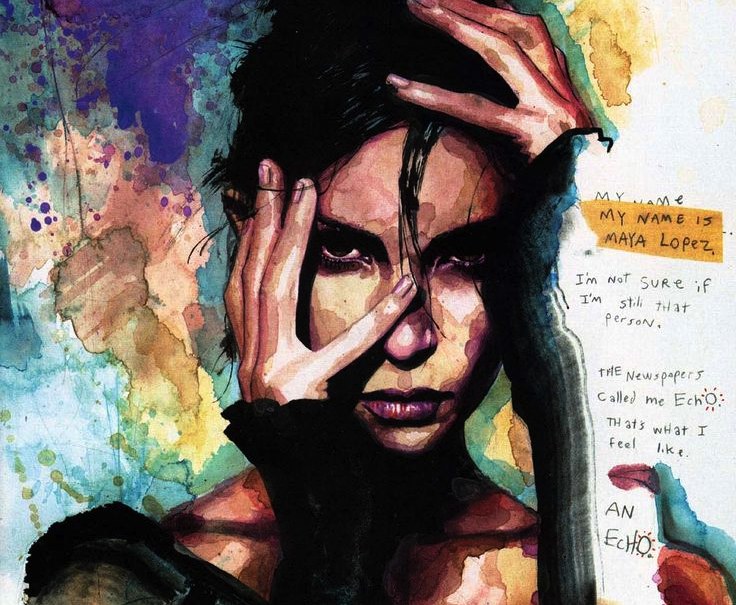
Maya Lopez is a deaf character of Cheyenne and Hispanic decent first introduced in the pages of Daredevil. It might seem gimmicky to pair her with the blind Matt Murdock, but the comics always treat Maya’s deafness seriously, and I’d love to see a respectful treatment done on screen, especially given the challenge of a central character who often relies on non-verbal (or at least non-spoken) communication. Although it would make the most sense to get Maya her own Netflix series to tie in with the current “street heroes” slate on Netflix, the reality is that her comics origin story is too similar to that of Elektra’s more well-known plot line—and Elektra already has a spot in Daredevil’s upcoming second season. Instead, I’d be interested to see Echo as more of an established superhero, perhaps more in line with her later alias, Ronin. As Ronin, Maya conceals her identity (and gender) beneath a more masculine costume and joins the Avengers, often fighting against super villain group The Hand. Coincidentally, The Hand maybe already sorta showed up in Daredevil’s first season (hi, Nobu!), so maybe they could find a place for Maya in that universe after all… –Sarah Tolf
Amanda Waller, a.k.a Amanda friggin’ Waller
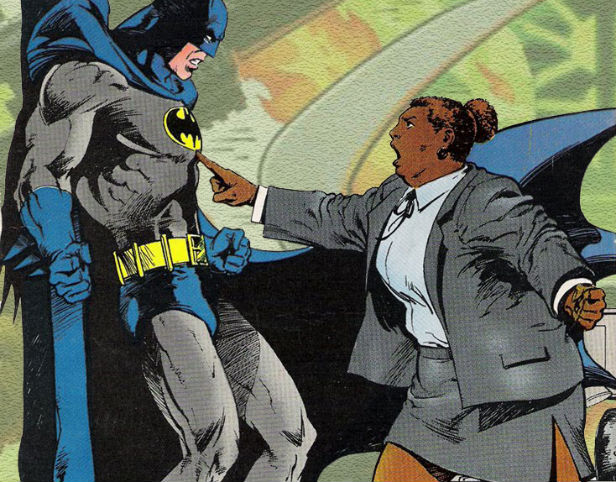
Amanda Waller makes her debut in the coming Suicide Squad film, and has already been seen in the Arrow-verse and seriously, any character who is so effective a puppetmaster that they can create the Suicide Squad with little more than blackmail and a steely gaze NEEDS her own show, post-haste. –Chris Lough
Renee Montoya, a.k.a. The Question
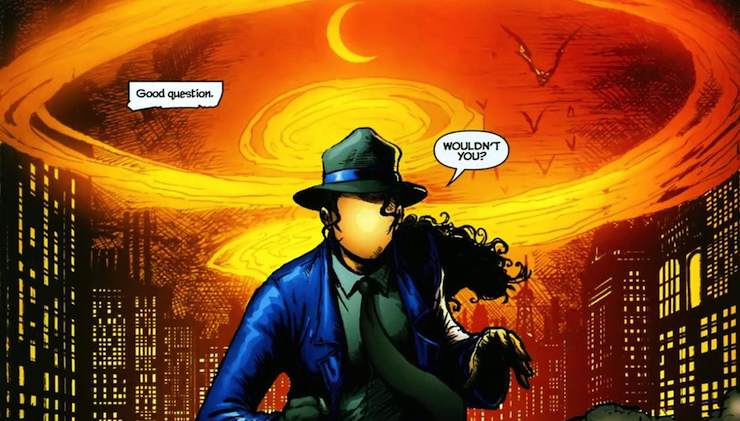
Renee Montoya is already on Gotham where she is woefully underused, and not particularly well-characterized. But forget all that—combining various aspects of Montoya’s tenure in comics would make for an excellent television show. Just forgo the “weekly cop show” trappings entirely, and start the narrative after Montoya has been outed as a lesbian by one of Gotham’s villains. Deal with the family difficulties this creates for her, and her withdrawal from the force. Then, up pops the Question! (Otherwise known as Vic Sage, otherwise known as ‘the character Rorshach was based on.’) He wants to train her to fight crime and find her true self. Montoya becomes the Question and later gets to date Batwoman. THIS WOULD BE THE BEST. Renee Montoya is the best, and starring in her own show after years of supporting on screen is honestly the least the universe could do. She’s funny, smart, and she gets the best costume. Give it. –Emmet Asher-Perrin
Jubilation Lee, a.k.a. Jubilee

Jubilee is a severely underutilized character, and for decades X-Men writers have struggled to get a handle on her. First she was a mall-rat (it was the late 1980s and Chris Claremont was operating at peak Chris Claremont), then she was Wolverine’s sidekick, then she was a slacker student, then a vampire, then a… mom? Okay.
The thing is, Jubilee is already interesting without having to pile on vampirism or babies that are actually just plot devices. She’s the daughter of wealthy Chinese immigrants and is pushed into competitive gymnastics at an early age. Then her parents are murdered. THEN she finds out she’s a mutant. Although Jubilee is depicted as a self-possessed, happy-go-lucky teen, her background is fairly dramatic. For one, training for competitive gymnasts is a mentally and physically intense process to put a child through. This alone suggests there is a lot of material to be mined from how Jubilee’s parents treated her. Did Jubilee resent them? Does she feel guilty that they died with her resenting them?
Further, it would be interesting to explore how Jubilee’s privileged upbringing would affect her viewpoint of herself as a mutant. Would it reverse how she is viewed by society? Would that be a shock? Would she then become more aware of other stereotypes that Americans of Chinese descent are subject to? Finally, after all of this, what prompts her to want to be supportive and bright and outgoing? And how might that change once she grows out of her teen years and starts being a 20-something that needs a job, and a roommate, and…?
I think there’s a real opportunity through Jubilee’s story to depict how the current generation of young people (millennials, or whatever’s coming next) would react to having superpowers, and how those powers would play into the reversals of class, race, and fortune that this generation is currently experiencing. Taking Jubilee seriously would bring some hefty dramatic rewards for television viewers. It would also probably be a pretty funny superhero show. –Chris Lough
Ororo Munroe, a.k.a. Storm
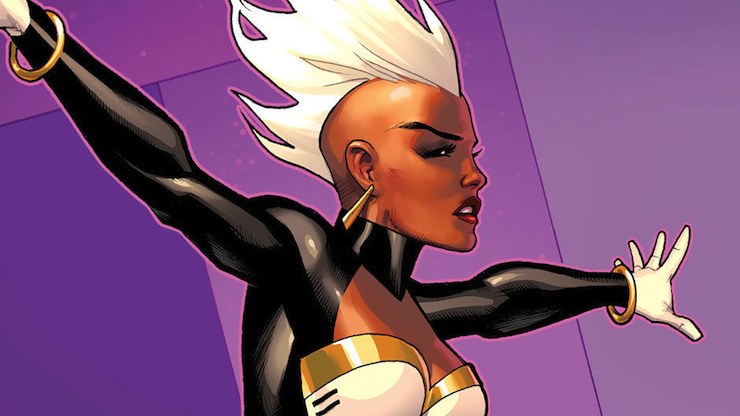
You know the main thing that has always sucked about the X-Men movies? A severe lack of Storm. While this was arguably due to miscasting, it doesn’t make the slight any less prominent. To spend so much time watching Wolverine cry about Jean Grey when we could have been watching Storm rule the freaking universe is tragic. Boo on Logan. Boo on Phoenix. Boo on Scott Summers weeping all the time. You could handle a Storm show so many different ways too, which makes the prospect of creating one even more fun—should it be a mutant school show? An X-team show? I know that Marvel can’t use the X-Men in the MCU, so maybe just do a cool throwback 80s show with mohawk Storm and all her punk mutants friends. Literally just call the show Storm and Friends. Make it a lighthearted spin-off of the current movies; they’re so sad that it would be a welcome reprieve from The Multi-Generational Love Story of Magento and Professor X any day of the week. –Emmet Asher-Perrin
This isn’t a complete list, obviously. (What about Swift? Or Nico and the Runaways? Or M? Or…) And there are even more examples here. But it is a reminder (perhaps to ourselves, most of all) that different perspectives on our world can result in fascinating stories and nuanced characters with wide appeal. A rising tide lifts all boats, and there’s so much more ocean out there…










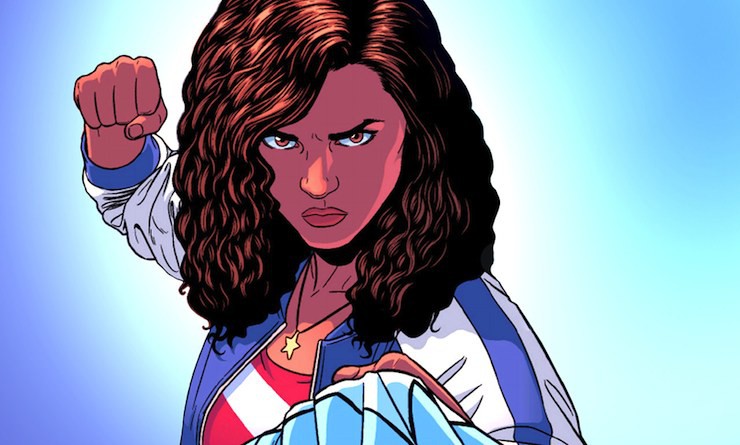
Montoya hasn’t been on Gotham for more than a year. She was last seen in episode 11 of season 1, even though the actress remained in the credits for the rest of the season. But she was officially dropped from the cast in season 2. (Ditto for her partner Crispus Allen, who was last seen in episode 9.)
How about Katana? She’s been featured pretty heavily in screen productions over the past few years — a recurring character on Batman: The Brave and the Bold, Batman’s partner on Beware the Batman, a supporting character throughout season 3 of Arrow, and now a cast member in the Suicide Squad movie.
Maybe Netflix Marvel could do a Misty Knight/Colleen Wing series spinning off of Luke Cage and Iron Fist. And there’s always Monica Rambeau, who was Captain Marvel long before Carol was.
As for an animated show becoming live-action — assuming you’re referring to a direct, in-continuity translation rather than an adaptation or remake — the only instance I can think of that’s an ongoing series is Code Lyoko: Evolution, a live-action/CGI sequel to the 2D animated/CGI French series Code Lyoko. But Cartoon Network’s Ben 10 did two live-action movies (the first of which was initially supposed to be in continuity with the cartoon, though it and its sequel were later established in the cartoon as being set in an alternate timeline), and Nickelodeon’s The Fairly Oddparents has done three live-action movies featuring a grown-up version of the cartoon’s main character, with the same creative team as the show and some of the same voice actors.
That is some messed up anatomy on Spider-Man. How long are his legs — especially the left one?
@2/Jeff: Spider-Man is superhumanly flexible and able to pose in extremely contorted ways. That’s been one of his trademark powers since 1962. I don’t think there’s anything wrong with his proportions there; we’re just seeing his torso from “above,” essentially, so his hips are mostly behind his shoulders from our vantage.
I’m an artist myself, and understand artist artistic exaggeration. Here’s what it looks like when you draw it through. Not saying you’re not allowed to like it, but it really jumped out at me and made me go “nope”.
Sorry. I promise I’ll stop derailing discussion now.
^But both thighs you’ve drawn there are the same length, and from knee to hip is about 2 to 2.5 heads high. I don’t see the problem.
The problem with Kamala is, unless you’re setting it in it’s own continuity, you kind of need Carol Danvers first for her to be a fangirl over (and she needs to be a public heroine, which, well, we don’t know if that’s going to be in the cards yet). And ideally a few more other established heroes would be good, too (even if they’re the low-rent kind on Agents of SHIELD). You could rewrite her so that she’s a fan of somebody else and just designs the Ms. Marvel name herself (or doesn’t take on a name/costume) until Carol comes along I suppose, but it’s tricky and a lot of the fun of her is her unabashed fangirlism. I suppose you could start laying groundwork early though and introduced a non-powered version of her, say, in Jessica Jones S2 as a middle schooler who’s part of a superhero fanfic circle.
Miss America, on the other hand, you could use the fact that other characters she’s associated with haven’t been introduced yet, as an asset, since she comes from other dimensions, she can not only refer to heroes who haven’t appeared yet (“Wait, you don’t have the Young Avengers on this world? I have to go to the REGULAR ones?”), she could conceivably interact with different “versions” of some of them. It could be a fun way to introduce the multiverse to the regular movieverse. Hell, if you REALLY wanted to (assuming the multiverse as a concept still exists in the comics at that point), you could literally make her the same character from the comics, just that the TV show is showing her adventures through various worlds.
I’m still hoping for an America Chavez solo comic book.
I liked Renee Montoya better before she was the Question, back in the 52 series (Batwoman too).
I would love to see Captain Marvel/Monica Rambeau on TV, in the movies, animated web series, whatever! She’s one of the more respected (and one of the most powerful) members of the Avengers, but she often gets shelved or treated as an afterthought or has her name taken by a colleague without even a phone call (had to learn by Google alert and everything).
Hopefully the Ultimates will become one of Marvel’s most popular comics (3 issues in and it looks pretty good, plus it includes Captain Marvel old, Captain Marvel new and Miss America Chavez, along with Black Panther and Blue Marvel; an amazing and powerful cast!) and Marvel Comics will continue to expand her exposure.
@@.-@
Thank you! That just helped explain why thought that picture was off. Not being an artist I couldn’t explain other than a feeling that it just didn’t look right. Maybe Spiderman is that flexible but it just doesn’t look right.
So, I’ll probably get hell for this but I have to say it.
Don’t you find these kind of posts offensive? Why do African/Asian/Hindu/women/gay/trans etc need to have a certain percentage of X?
I read articles titled “We need more women in fantasy literature“. Why? I don’t understand why it matters if the author is man/woman/black/white/gay/straight. To me, everyone is the same. Human.
By separating one group you imply that this group is different and deserves special treatment. I thought that the meaning equality is that everyone is the same. We are all human. Demanding percentages (like with the oscars) is auto-racism. Is a blond person different than a brown haired person? No. Is an African American different than a Caucasian? No. Is a gay different than a straight? No. That’s equality.
So, as for this article, why should female heroes of color get their own TV show? Why not trying to find underestimated heroes regardless of their sex and color that should have their own TV show?
@10 Because that approach tends to end up with a bunch of stories about straight white guys. Equality does not imply sameness rather it concerns equal treatment. Currently female heroes of colour do not get equal treatment, but tend to be neglected and discarded in favor of white and/or male heroes.
I recommend questioning the status quo before attacking attempts to change it. Why should white male heroes get their own TV show?
@10, Everyone is equally human and should be treated equally, yes. But there are two concerns I have with “colorblindness.”
1. We are all human, but our experiences, perspectives, etc., are all different, due to race, gender, religion, sexuality, ethnicity, nationality, etc. My perspective (straight, white, cis woman) is going to be different from someone who is “African/Asian/Hindu/women/gay/trans etc.” It’s dangerous not to acknowledge that. It can easily turn into stripping someone of their identity, ethnicity, what have you. We should see more female POC because they offer different perspectives, worldviews, and ideas than what we normally see, as stated in the first two paragraphs of the piece. That’s one of the beauties of fiction: seeing the world from someone else’s eyes. Challenging your preconceived notions. And while we are all human, we are also all different.
2. It is admirable that you see people all as just human. Unfortunately, a lot of people don’t. In a perfect world, the race-blind or gender-blind attitudes would create fiction that roughly mirrors the statistics that are in the real world. But they don’t, which means that there are people who, consciously or unconsciously, don’t see everyone as equal, deserving of attention. That’s a problem. Being blind to race is not the same thing as being blind to racism.
@11
You missed my point. Is there a status quo against gingers? Because there aren’t many gingers protagonists. How about Italians? Or Native Americans.
My point is: Don’t divide people into groups. That’s self-racism.
@12
I see both your points and will take them into consideration.
@13, Yes, all of those groups mentioned are the targets of racism in varying ways.
And you still haven’t addressed that 50 years after we all began to look at people based on the “content of their character” instead of the color of their skin, we still haven’t achieved racial parity in representation.
@13 There’s certainly a bias against Native Americans and potentially Italians. No idea about gingers.
When the mainstream stops dividing people into groups, only then will I ask minorities to do the same.
@10: Take the Oscars, just as a for instance.
Either you believe that white people are naturally better actors, writers, directors, etc, to a dramatic degree, such that the vast, vast majority, not just this year, but in virtually every year, of nominees and winners are white, or you believe that there is SOMETHING going on, maybe not intentionally, but real, and that something is not good and, in order to make things better, we should try to discourage it from happening in the future, whether by pointing it out when it happens and making people think about possibly unconscious biases, or encouraging more stories told about people of color so that there isn’t simply a huge majority of movies featuring whites in lead roles, or some other technique that requires being aware there’s a problem.
I don’t see there being all that much wiggle room between the two positions.
One of those ideas is racist. The other? Well, maybe it is, maybe it isn’t, but if it is, IMHO it’s of a much less dangerous kind.
ghostly1 @17- The Oscars are affected by the voters, who are people making movies in front of, behind, and on the sets and offices at the studios. And all kinds of people aren’t there in the same proportion as in the population at large.
@19, The Oscars are also effected by marketing campaigns.
Like the one that hyped Stallone’s performance in Creed, while ignoring the performance of Jordan and the direction of Coogler.
@19: Right, that’s not all there is to it, but it’s certainly a factor… which is a reason to advocate for more diversity in those careers. It’s hard to directly advocate for more people BEHIND the scenes, but articles like this are a way to show interest in characters that are being underrepresented. And the fact that there are more people in the movie industry of one race or another… all you have to do is take a step back from the original thought on the Oscars: Either you believe that whites are so naturally talented at movie-making that there’s obviously much more of them in that field than their population statistics would indicate, or you think there’s something going on worthy of comment and occasionally action to work against. Again, not necessarily outright “I hate black people and I’m not going to hire them” racism, but it could be unconscious biases, or “I have no problems MYSELF, but I believe that because people in general are a little racist that movies starring non-whites don’t do as well financially and I’m all about money here”, or sometimes a legacy of who gets into film/acting school, or who manages to make it out to Hollywood to pursue those dreams, in which case you merely have to take another step back to ask the question again.
You always have to keep in mind, racism is bad because it hurts people. If it didn’t hurt people, it would be just a funny quirk some people have. So if you do things like “I’m going to write an article spotlighting female heroes of color”… yes, technically, you MIGHT consider it racist, and sexist because they’re not also spotlighting white males. But, white males getting more than their fair share of spotlight is what’s causing harm, and articles like this are helping to combat that harm. So, when people post indignantly about them, I’m not particularly sympathetic, and forced to wonder why they choose THIS manifestation of (arguable) racism to get upset about when there are so many ones actually harming people. Now, sometimes it might be that they simply haven’t thought things through, and so I try to help explain the issues and make it clear what’s going on, maybe give them a different perspective on the way they’re thinking. At the same time, it seems to happen an awful lot and sometimes they dismiss these points and just keep on insisting articles like these are bad because it’s just “more racism” and I wonder, are these same people also among those wanting to take Hollywood to task for hiring disproportinately more whites, for choosing to create white lead characters again and again when there are other options available, for choosing to have one token woman in a big-budget movie? Possibly… but I doubt it.
Danielle Moonstar (Psyche/Mirage) please, preferably as a Valkyrie.
Some of these characters sound really interesting. It’s just a shame that you’ve completely neglected to even reference the fact that there is ONE female superhero of colour already on TV – Daisy ‘Quake’ Johnson is the lead protagonist of Agents of SHIELD – played by the marvellous Chloe Bennet.
It’d be nice if more people acknowledged Daisy/Chloe is the lead of AoS and not, for example, Phil Coulson/Clark Gregg – ‘cos much as I love the latter, he’s definitely NOT the show’s protagonist. AoS has *always* been Daisy’s origin story. And ignoring that is problematic. I’m all for more diversity (and we should DEFINITELY have more!) but please don’t pretend that there are no female superheroes of colour out there already.
They all deserve their own shows. They could rotate them or scatter them here and there… I was so happy to learn abut them! Go, girls!!
“there is ONE female superhero of colour already on TV – Daisy ‘Quake’ Johnson is the lead protagonist of Agents of SHIELD – played by the marvellous Chloe Bennet.”
And Melinda ‘the Cavalry’ May :-)
@26, May is awesome, but Bennet’s character is the main protagonist and always has been.
In addition to all of this, there is also Legend of Korra, which put a queer female hero of color on TV.
Personally I’m still pretty annoyed at DC for changing Amanda Waller from a powerful overweight middle-aged black woman to a powerful skinny young black woman. She’s still a cool character but… yeah. :/
I’ve been saying for ages that an Icon and Rocket film would be super-amazing (pun only semi-intended. :P).
Personal additions to the list:
* Cassandra Cain – Batgirl. Cass is brilliant. For those of you unfamiliar with the character she was raised by assassins to read and speak body language rather than vocally making her amongst the most skilled martial artists on earth
* Jenny Quantum (from The Authority) – born at exactly midnight on January 1, 2000 she is literally the embodied spirit of the 21st Century.
An issue with both my picks (along with a couple of the official ones like Ms Marvel and The Question) is that they’re latest incarnation of legacy characters which makes origin stories tricky if you want to start a series with them.
On the topic of quotas, I don’t personally like them. I think they’re divisive. By fighting unfairness with unfairness they get a lot of people’s backs up because counter-unfairness is still unfairness. Quotas get results, but I’m not convinced they don’t harm the cause more than they benefit it.
IMO, what we need is not the forceful instrument of quotas but creators who stop *defaulting* to white and male characters.
I actually think the best thing to do is what we’re doing: keep pointing out the disparity, keep demanding morediversity media and keep creating it. It’s slow and frustrating, but I actually think it’s working. Pretty much everyone born in the last decade or two is very aware of issues of under-representation in the media. Ultimately, it’s slow and frustrating because the major cure to it is generational change.
The arrival of crowdfunding helps. It allows us to put our money where our mouth is and *support* more diverse media (*cough* ‘People of Colour destroy Science Fiction’ on Kickstarter right now *cough*). The media industry may be conservative in many ways and will almost certainly be slow to join the party but they’ll still go where they see people spending money.
I fully expect to see diversity in the media *massively* increase in the next few decades as the new guard replaces the old.
So, does Daisy Johnson/Quake/Skye (Chloe Bennet) not count or something? She is arguably the protagonist of Marvel’s Agents of SHIELD, she is of mixed race descent, is a female hero of colour and also happens to be the first WoC superpowered individual in the Marvel Cinematic Universe (MCU). I think that it is great that you are bringing up these other characters who deserve more than they currently get in their respective fandoms, however to completely erase the fact that Marvel’s Agents of SHIELD and their showrunners (one of whom is also a WoC) were being so progressive with their casting choices and how proud Chloe Bennet is with being the first WoC superpowered individual in the MCU.
@29/Sonia: For one thing, Agents of SHIELD is primarily Phil Coulson’s show, built to give Clark Gregg a star vehicle with everyone else in supporting roles. So it couldn’t be called Daisy’s own show in the same way that Agent Carter is Peggy’s own show or Supergirl is Kara’s own show. Second, I think this thread is about characters who are originally women of color in the comics and who deserve more recognition, as opposed to white characters given an ethnicity change onscreen like Daisy, Deena Pilgrim, etc.
I have to agree that Agents of SHIELD doesn’t count. As the title suggests, it’s an ensemble show. Skye’s in it, but it’s not her show.
As an aside, I hadn’t actually realised that Chloe Bennet was Asian. She certainly counts, but it’s also important that diversity be visible. If most people of colour on TV and in the movies are the ones who can pass as white, that’s still an issue.
@31/Irrevenant: I disagree. Bennet only reads as white if you’re predisposed to expect people to be white. I couldn’t tell she was part-Asian myself, but I recognize that’s because of my own unconscious biases and life experience, and that my expectations should not be the measure of all things. What matters is who she is, not what expectations and assumptions we project onto her. And saying that people of color only “count” if they obviously conform to accepted visual signifiers of race is prejudiced in itself. People need to learn that ethnicity is a continuum, not a set of clearly delineated boxes. And there are more and more people in each generation of mixed ethnicity, so the old categories are growing even more useless.
@ChristopherLBennett Which is why I explicitly said that she still counts in my original post.
I was raising a separate but related issue: that, when the media do cast people of colour, they tend to cast ones who are closer to white. Darker-skinned black actresses still find it harder to get work than lighter-skinned ones, for example.
What you were saying about there being a continuum of ethnicity is exactly the point (though I wish there was a better word than ‘continuum’ since it implies a simple one-dimensional gradient between A and B). “We’ll cast non-white people as long as they don’t look too far from white” is still a problem and it still alienates many members of society.
@31 Chloe Bennett was born Chloe Wang, making her mixed ethnicity, not just “raised as.” but it seems like you’re editing you’re argument after you found out she’s part Chinese taking the “looks white” approach. You can’t ignore somebody ethnicity because they look a certain way to prove your point my friend.
ghostly1 @21- I’m not disagreeing with your reply, but I am trying to say that I think root causes should be adressed. At least , in this case, encourage high schoolers to consider entering the Hollywood workforce and what preparation that may entail.
Diversity was barely present in my high school drama classes, which was not the case for the student body. Same for other creative arts and tech classes (like for electricians or set construction). I want to be part of the change (I help and support my high schooler, and encourage her to consider nontraditional classes and fields), not “raise awareness” and expect someone else to accomplish the change.